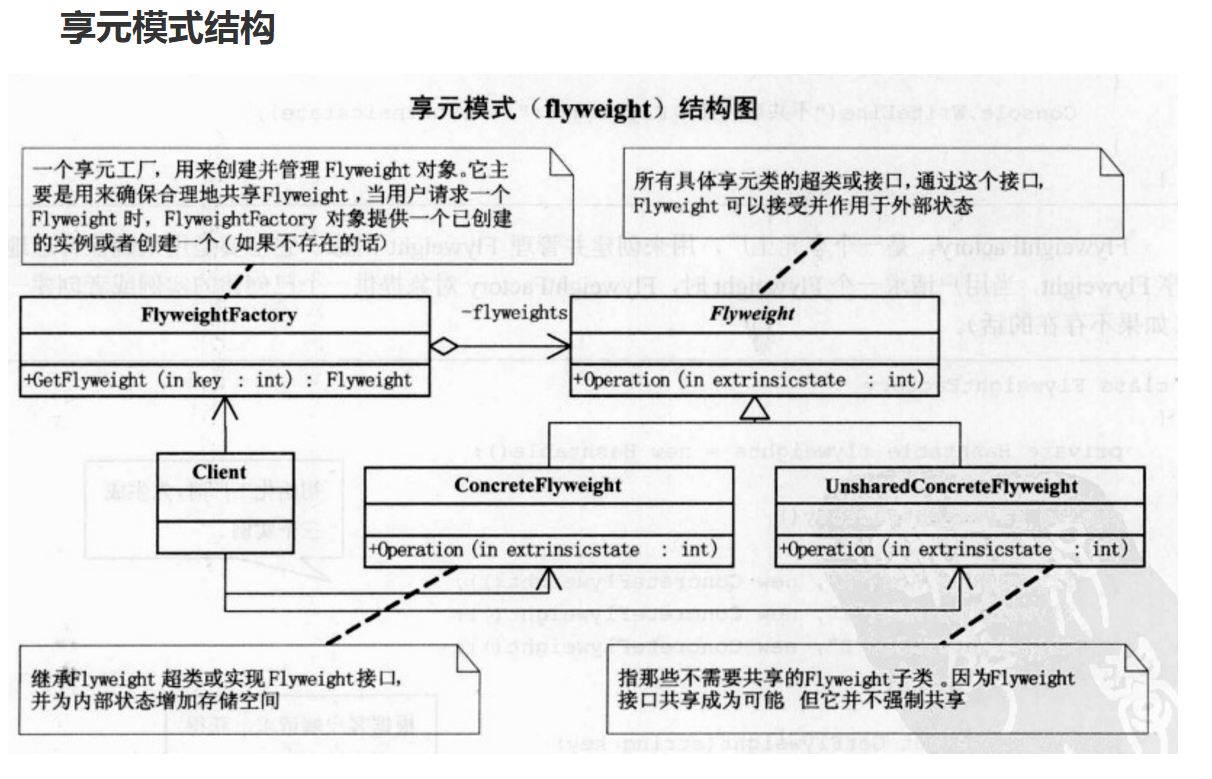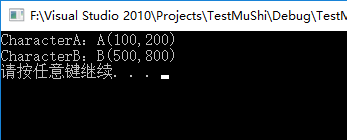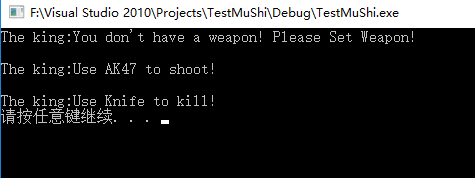1.享元模式
类图
#include "stdafx.h"
#include <iostream>
#include <map>
using namespace std;
/********************************************享元模式*******************************************/
#if 1
class Character
{
public:
virtual ~Character(){};
virtual void SetSize(int, int) = 0;
virtual void Display() = 0;
protected:
Character(){};
char m_chSymbol;
int m_nWeight;
int m_nHeight;
};
class CharacterA : public Character
{
public:
CharacterA();
virtual ~CharacterA();
void SetSize(int, int);
void Display();
};
CharacterA::CharacterA()
{
this->m_chSymbol = 'A';
this->m_nWeight = 100;
this->m_nHeight = 200;
}
CharacterA::~CharacterA()
{
}
void CharacterA::SetSize(int nWeight, int nHeight)
{
this->m_nWeight = nWeight;
this->m_nHeight = nHeight;
}
void CharacterA::Display()
{
cout << "CharacterA:" << m_chSymbol << "(" << m_nWeight << "," << m_nHeight << ")" << endl;
}
class CharacterB : public Character
{
public:
CharacterB();
virtual ~CharacterB();
void SetSize(int, int);
void Display();
};
CharacterB::CharacterB()
{
this->m_chSymbol = 'B';
this->m_nWeight = 100;
this->m_nHeight = 200;
}
CharacterB::~CharacterB()
{
}
void CharacterB::SetSize(int nWeight, int nHeight)
{
this->m_nWeight = nWeight;
this->m_nHeight = nHeight;
}
void CharacterB::Display()
{
cout << "CharacterB:" << m_chSymbol << "(" << m_nWeight << "," << m_nHeight << ")" << endl;
}
class CharacterFactory
{
public:
CharacterFactory();
virtual ~CharacterFactory();
Character* GetCharacter(char);
private:
std::map<char, Character*> m_mChar;
};
CharacterFactory::CharacterFactory()
{
m_mChar.insert(make_pair<char, Character*>('A', new CharacterA));
m_mChar.insert(make_pair<char, Character*>('B', new CharacterB));
}
CharacterFactory::~CharacterFactory()
{
map<char,Character *>::iterator iter = m_mChar.begin();
for(;iter != m_mChar.end();++iter)
{
delete iter->second;
iter->second = NULL;
}
m_mChar.clear();
}
Character* CharacterFactory::GetCharacter(char chIn)
{
map<char, Character*>::iterator it = m_mChar.find(chIn);
if(it != m_mChar.end())
{
return (Character*)it->second;
}
return NULL;
}
int _tmain(int argc, _TCHAR* argv[])
{
CharacterFactory* pFactory = new CharacterFactory;
Character* ch1 = pFactory->GetCharacter('A');
ch1->Display();
Character* ch2 = pFactory->GetCharacter('B');
ch2->SetSize(500, 800);
ch2->Display();
system("pause");
return 0;
}
#endif 运行结果
优点:
1、享元模式的优点在于它能够极大的减少系统中对象的个数。
2、享元模式由于使用了外部状态,外部状态相对独立,不会影响到内部状态,所以享元模式使得享元对象能够在不同的环境被共享。
缺点:
1、由于享元模式需要区分外部状态和内部状态,使得应用程序在某种程度上来说更加复杂化了。
2、为了使对象可以共享,享元模式需要将享元对象的状态外部化,而读取外部状态使得运行时间变长。
2.策略模式
#if 1
class WeaponBehavior
{
public:
void virtual useWeapon() = 0;
};
class AK47:public WeaponBehavior
{
public:
void useWeapon()
{
cout << "Use AK47 to shoot!" << endl;
}
};
class Knife:public WeaponBehavior
{
public:
void useWeapon()
{
cout << "Use Knife to kill!" << endl;
}
};
class Character
{
public:
Character()
{
weapon = 0;
}
void setWeapon(WeaponBehavior *w)
{
this->weapon = w;
}
void virtual fight() = 0;
protected:
WeaponBehavior *weapon;
};
class King:public Character
{
public:
void fight()
{
cout << "The king:" ;
if ( this->weapon == NULL)
{
cout << "You don't have a weapon! Please Set Weapon!" << endl;
}
else
{
weapon->useWeapon();
}
}
};
int main()
{
WeaponBehavior *ak47 = new AK47();
WeaponBehavior *knife = new Knife();
Character *kin = new King();
kin->fight();
cout << endl;
kin->setWeapon(ak47);
kin->fight();
cout << endl;
kin->setWeapon(knife);
kin->fight();
system("pause");
return 0;
}
#endif 运行结果
优点:
1、 简化了单元测试,因为每个算法都有自己的类,可以通过自己的接口单独测试。
2、 避免程序中使用多重条件转移语句,使系统更灵活,并易于扩展。
3、 遵守大部分GRASP原则和常用设计原则,高内聚、低偶合。
缺点:
1、 因为每个具体策略类都会产生一个新类,所以会增加系统需要维护的类的数量。
2、 在基本的策略模式中,选择所用具体实现的职责由客户端对象承担,并转给策略模式的Context对象
3.单例模式
参照:https://www.cnblogs.com/qiaoconglovelife/p/5851163.html 点击打开链接
这个链接已经讲的很清楚了,下来给你们看下单例模式的模板
#include<mutex>
#include<memory>
#include<iostream>
template<class T>
class Singleton{
public:
template<class ...Args>
static inline std::shared_ptr<T> instance(Args&&... args){
if (!instance_.get()){
std::unique_lock<std::mutex> lock(instanceMutex_);
if (!instance_.get()){
instance_.reset(new T(std::forward<Args>(args)...));
}
}
return instance_;
}
private:
Singleton() = default;
virtual ~Singleton() = default;
Singleton(const Singleton&) = default;
Singleton& operator=(const Singleton&) = delete;
private:
static std::shared_ptr<T> instance_;
static std::mutex instanceMutex_;
};
template<class T>
std::shared_ptr<T> Singleton<T>::instance_;
template<class T>
std::mutex Singleton<T>::instanceMutex_;
#define SINGLETON_DECL(type) \
friend class Singleton<type>; \
friend class std::shared_ptr<type>; \
class Test1{
public:
Test1(int age, std::string name) :age_(age), name_(name){
std::cout << "Test1" << std::endl;
}
private:
SINGLETON_DECL(Test1);
int age_;
std::string name_;
};
class Test2{
public:
Test2(int age, std::string name,std::string addr) :age_(age), name_(name),addr_(addr){
std::cout << "Test2" << std::endl;
}
private:
SINGLETON_DECL(Test2);
int age_;
std::string name_;
std::string addr_;
};
class Test3{
public:
Test3() {
std::cout << "Test3" << std::endl;
}
private:
SINGLETON_DECL(Test3);
int age_;
std::string name_;
};
int main(){
auto test = Singleton<Test3>::instance();
std::cin.get();
return 0;
}

























 613
613











 被折叠的 条评论
为什么被折叠?
被折叠的 条评论
为什么被折叠?








